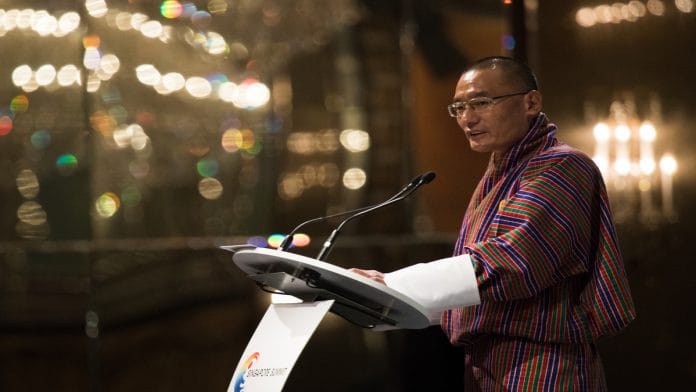The elimination of outgoing PM Tshering Tobgay’s party is a signal that Bhutan doesn’t want to be seen as either pro-India or pro-China.
New Delhi: Bhutan’s pro-India People’s Democratic Party (PDP), led by outgoing Prime Minister Tshering Tobgay, was knocked out of the general election Saturday, with the ‘Doklam factor’ being widely seen as responsible for the shock defeat.
The tiny mountain kingdom will now vote in the final round on 18 October, between the Druk Phuensem Tshogpa (DPT), which was in opposition in the outgoing parliament, and the Druk Nyamrup Tshogpa (DNT), an outside political force that nevertheless rallied to win the highest number of votes in the first round Saturday.
The DNT won 92,722 votes, followed by the DPT, which got 90,020.
In the Bhutanese system, only these two parties will now vie for power. Tobgay’s PDP, which came third, will not be allowed to contest.
The words “India”, “China” and “Doklam” were hardly spoken during the campaign that led to the first round of elections.
Also read: Modi govt beats China in high-stakes battle over dam in Nepal
But the 72-day standoff between Indian and Chinese troops on the disputed Doklam plateau last summer has been front and centre in the minds of Bhutan’s elite ever since.
“The elimination of Tshering Tobgay’s party is a signal that Bhutan wants to reclaim the centre,” a Bhutanese analyst told ThePrint.
“It doesn’t want to be seen as either pro-India or pro-China,” the analyst added.
The significance of this statement cannot be underestimated. Bhutan’s young and very popular king Jigme Khesar Namgyal Wangchuk was warmly feted during his visit to Delhi last November, when he brought his first-born, Prince Jigme Namgyel Wangchuk, to meet the Indian leadership.
The visit came against a backdrop of the Doklam standoff and the cancellation of the 24th round of boundary talks between Bhutan and China.
Those talks were supposed to take place in March, but were pushed to July.
‘Old concerns’
After the meeting between Chinese vice-foreign minister Kong Xuanyou and Bhutanese foreign minister Lyonpo Damcho Dorji, a Chinese foreign ministery spokesperson said both sides had discussed many issues, including “the boundary issue and reached many agreements”.
A second Bhutanese analyst told ThePrint that the “Doklam standoff had brought back old concerns about the disputed and unregulated border between Bhutan and China”.
Also read: One year after Doklam, China intrudes again — in Ladakh
The analyst pointed to the crux of the matter: The Chinese, for some decades, had been pressing Bhutan to exchange territory in its disputed south, for example the Jampheri ridge, for territory in Bhutan’s north, said to include the traditional grazing lands of the royal Wangchuk dynasty.
India had been resisting the exchange, the analyst added, because Jampheri ridge overlooks the Chumbi Valley in India’s Sikkim.
The Doklam standoff had begun last June because the Chinese wanted to build a motorable road across the Doklam plateau to access the Jampheri ridge (the Chinese call it Zompelri ridge), but Indian troops prevented them from doing so.
Delhi’s primary goal was to stop soldiers of the Chinese People’s Liberation Army (PLA) from taking the Jampheri ridge. They succeeded in doing that, returning Doklam to status quo.
But the fact remains that the Bhutanese never liked the international attention they were forced to reckon with during the Doklam standoff.
It was as if the world had rediscovered Bhutan and was now examining its sensitive geostrategic location tucked between its two big neighbours, India and China.
The elimination of Tobgay’s PDP from the electoral contest Saturday is significant, the Bhutanese analyst said, because it signals Bhutan’s determination not to get involved in the India-China squabble for expanding influence.
Traditionally, Bhutan has been seen as India’s closest friend, not only in south Asia, but also internationally. But over the last decade, Thimphu has been trying to assert its distance from New Delhi, in small but significant ways.
Taken aback
In 2012, then prime minister Jigme Thinley – he was from the DPT — met the then Chinese premier Wen Jiabao in Rio de Janeiro. The same year, he also made a bid for Bhutan to get a non-permanent seat in the United Nations Security Council, which startled Delhi, to say the least.
The speculation, at the time, was that Delhi was quite taken aback at Thinley’s seeming independence.
But Jigme Khesar Wangchuk, the young but wise king, soon sent a message of reassurance and reaffirmation of the special relationship to Delhi. India responded by inviting him to be the chief guest at the Republic Day celebrations in January 2013.
Also read: This is the first official account of the India-China face-off in Doklam
In the 2013 elections, Thinley’s DPT lost badly to Tobgay’s PDP. Thinley quit the party soon after.
Now, the DPT is very much back in the game, although Thinley has given way to Pema Gyamtsho.
In its manifesto, the DPT said it was “committed to maintaining and furthering excellent relations” with India, ramping up at least three hydropower projects with India, and boosting electricity generation from 1,606 MW to 10,000 MW.
The DNT’s manifesto, meanwhile, promises to diversify Bhutan’s economy, saying that 75 per cent of its external debt is due to loans for hydropower projects.







It is only a matter of time before Bhutan establishes diplomatic relations with China.